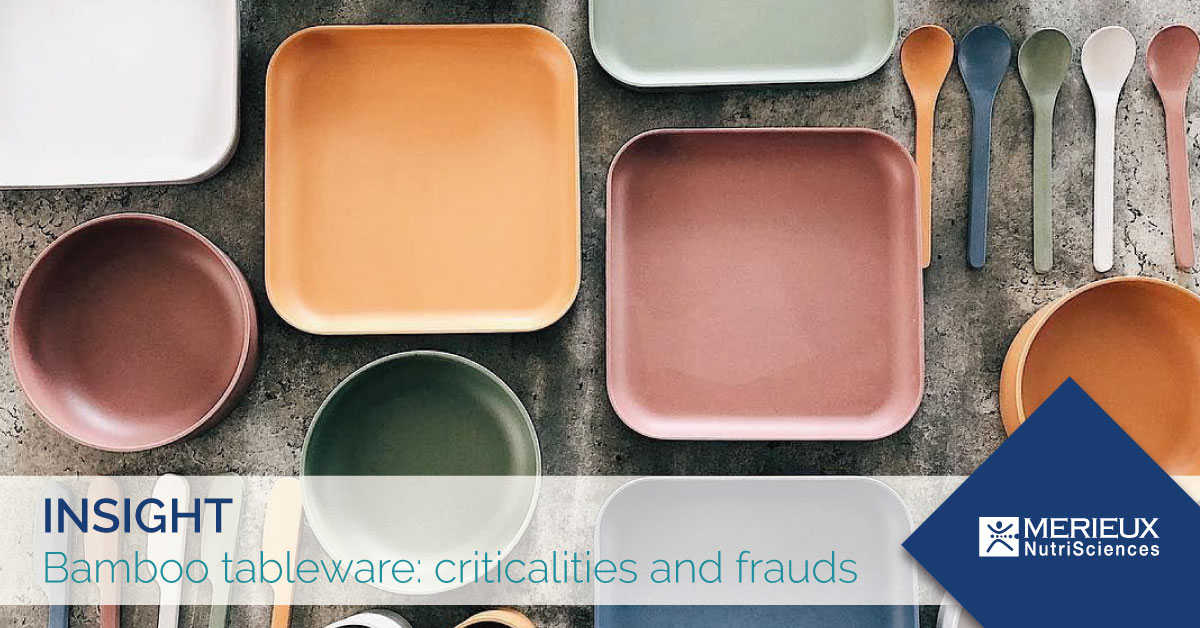BAMBOO FIBER TABLEWARE: CRITICALITIES AND FRAUDS

Following the entry into force of the European directive that bans single-use plastic (EU Directive 2019/204), the traditional "disposable" plastic plates and glasses are increasingly replaced by bamboo fiber tableware, which are rewarded by consumers as they are resistant, washable and economical items (we mainly refer to plates, bowls, cups).
Products in this family are very similar to melamine products, but contain ground bamboo or other similar constituents, such as corn, used as additives.
POSSIBLE GAPS FOR BAMBOO TABLEWARE
However, bamboo fiber tableware can have food safety gaps. Already in 2019, the Bundesinstitut für Risikobewertung (German Federal Institute for Risk Assessment) warned about the potential risks associated with the use of these products as, if filled with hot liquids or foods, they can release significant quantities of melamine and formaldehyde. Some analytical tests have confirmed this thesis: the release of formaldehyde in cups with bamboo fiber can exceed 30 times the tolerable daily dose for adults and even 120 times that suggested for children.
These substances, although admitted by the EU in the production of plastic materials intended to come into contact with food, are subject to specific migration limits (SML): of 15 mg / kg for formaldehyde, 2.5 mg / kg for slime (EU Recommendation 2019/794).
CONSEQUENCES ON THE REGULATORY SCENARIO
To better regulate the increase of this new family of FCM (food contact materials) composed of plastic and other natural fibers, on 23 June 2020 a team of European experts published a note on the use and placing on the market of these materials. The working group highlighted a first criticality: many of these products arrive on the market with the promise of being "sustainable" or "natural", but do not reflect the true nature of the product, thus misleading the final consumers (Reg. 1935 / 2004 Art.3). The note concludes by indicating ground bamboo as an unauthorized material and therefore we do not find it present in the list of substances allowed in the production of plastic materials and objects intended to come into contact with food (Reg. 10/2011 - Annex I) .
As a result of this, many European Union countries, such as Belgium, Luxembourg, the Netherlands (Benelux), Finland and Ireland, have initiated measures to counter the importation of these materials and prohibit their sale on the market.
The criticality is confirmed by Safety HUD, the Mérieux NutriSciences tool dedicated to the constant monitoring of fraud and food safety issues.
In recent years, Safety HUD has collected 54 reports relating to food contact materials containing bamboo fibers in which it has been identified a migration of melamine exceeding the established limits and 63 reports in which the migration of formaldehyde exceeds the permitted limits. To these must be added the 17 reports of fraud in which the labeling of the product was misleading for the final consumer, as it focused on the "natural" or "eco-friendly" aspect rather than on the composition of the same.
Learn more about Safety HUD ask for a free trial.

